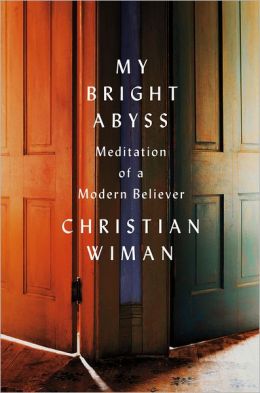Christian Wiman does not suck as a spiritual writer. In fact, he’s damn good – one of the best I have read in a very long time.
My joy at writing those lines is immense, because my relationship with “spiritual writing” (and with “spiritual reading”) can be summed up in one word: conflicted. Usually, I pick up a spiritual book intent on gleaning some wisdom only to become the occasion by which it realizes its hidden talent as a coaster on my nightstand. Discovering good spiritual writing (psst: there’s a lot of it on this site) is therefore a delight.
Wiman, who is the outgoing editor of Poetry magazine, today releases his new book of essays, My Bright Abyss.1 A married father of two in his late 40s, he is dying of a rare blood cancer. Raised in a fundamentalist Christian household, Wiman fell away from faith thereafter – or, as he puts it, faith was “latent” in him for many years.
Two things brought him – gradually – to realizing that belief: love and death. His prose is starkly and heart-rendingly beautiful in describing both. And he’s sensitive to the fact that, for many, religion is just a means of dulling the pain of those facing death:
That conversions often happen after or during intense life experiences, especially traumatic experiences, is sometimes used as evidence against them. The sufferer isn’t in his right mind. The mind, tottering at the abyss of despair or death, shudders back toward any simplicity, any coherency it can grasp, and the man calls out to God. […]
But how could it be otherwise? It takes a real jolt to get us to change our jobs, our relationships, our daily coffee consumption, for goodness sake—or, if we are wired that way, to change our addiction to change. How much more urgency is needed, how much more primal fear, to startle the heart out of its ruts and ruins.
In fact, Wiman generally thinks Christianity is poor anesthesia (or, better still, no anesthesia at all). In “Mortify Our Wolves,” he writes:
I am a Christian because of that moment on the cross when Jesus, drinking the very dregs of human bitterness, cries out, “My God, my God, why hast Thou forsaken me?” (I know, I know: he was quoting the Psalms, and who quotes a poem when being tortured? The words aren’t the point. The point is that he felt human destitution to its absolute degree; the point is that God is with us, not beyond us, in suffering.) I am a Christian because I understand that moment of Christ’s passion to have meaning in my own life, and what it means is that the absolutely solitary and singular nature of extreme human pain is an illusion. […] Christ’s compassion makes extreme human compassion—to the point of death even—possible. Human love can reach right into death, then, but not if it is merely human love.
Unflinching honesty in the face of death and awe in the face of love. These are marks of true religion, marks of good spiritual writing, and marks of a book well worth your time and money.
Cover photo: “Hole” by Anders Adermark via Flickr.
—//—
- Several of the essays in the new volume have appeared previously on The American Scholar’s website, where I first encountered them and where you can still read them. ↩



